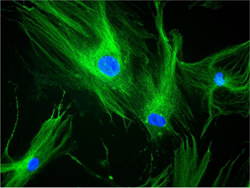
December 5, 2011 – University Hospitals Case Medical Center researchers could still be close to giving heart attack patients a second chance…just not as they originally thought.
The "LateTIME" trial was a study of adult stem cells (autologous) harnessed from bone marrow that were believed to have the ability to improve heart function after an attack if injected into the heart within two weeks of the attack.
Results were released this week at the 2011 American Heart Association (AHA) Scientific Sessions conference and were subsequently published this week in Journal of the American Medical Association (JAMA). The results have shown the injections within that timeframe were not favorable, but the concept showed great promise, according to an accompanying JAMA editorial that assessed the trial.
Despite the initial low return, the therapy had effectiveness for some of the patients that were enrolled in the trial as demonstrated by improved heart function post stem cell injection.
Both UH Case Medical Center's Drs. Dan Simon and Marco Costa, co-investigators in the LateTIME study, are currently participating in a similar trial, "TIME," which already has reduced the time between attack and stem cell injection.
The pair is optimistic the time variable adjustment in the new trial will lend favorable outcomes.
"We have reason to believe, as supported by data, that an adjusted injection timeframe could yield stronger results and support for stem cell injections rebuilding damaged heart muscle and function," said Simon, chief of cardiovascular medicine at UH Case Medical Center and the Herman K. Hellerstein Professor of Cardiovascular Research, Case Western Reserve University School of Medicine.
"The results were not positive, but if you put it into perspective, the foundation or blueprint for success was discovered and that could certainly lead to advanced treatment options for these patients," said Costa, director of the Interventional Cardiovascular Center and Research & Innovation Center at UH Case Medical Center as well as a professor of medicine at Case Western Reserve University School of Medicine.
The shared theories in both trials is that the specialized cells could have the ability to promote blood vessel growth, prevent cell death and transform themselves into a number of tissues, including muscle. After an acute heart attack, a remodeling process was initiated in the heart in an attempt to compensate for the damaged areas.
Researchers surmised that the condition of the heart muscle several weeks after the attack may differ considerably from the heart muscle in the acute stage setting. For some patients, delaying the delivery of stem cells by two to three weeks may have been better than initiating the treatment during the acute phase.
All patients underwent baseline assessments that included medical history, physical exam, electrocardiogram, blood draws, echocardiogram (ECG) and magnetic resonance imaging (MRI) tests. Participants were then assigned randomly to receive the stem cells or placebo within the aforementioned two-to-three week timeline.
The morning of stem cell or placebo infusion, a blood draw and bone marrow aspiration procedure of the hip bone are conducted to collect the stem cells. Later the same day, either stem cells or placebo are then infused through a catheter and directly into the damaged area of the heart.
Following the first 24 hours of the infusion, participants wear a small ECG machine, or Holter monitor. Additionally, patients record their body temperature twice a day for 30 days post infusion. Follow up visits at months one, three, six, 12 and 24 where baseline assessment testing are conducted.
The TIME trial adjusts that variable and results will be published in two years.
For more information: www.uhhospitals.org/case/tabid/853/uhcasemedicalcenter.aspx
Related Content About Stem Cell Therapies to Restore Heart Function
FDA Says Adult Stem Cell Research Shows Promise
Stem Cell Therapy Holds Promise for Treating Most Severe Cases of Angina
3-D Printed Patch Can Help Mend "Broken" Heart
Cardiac Regeneration After MI: Role of the Extracellular Matrix
Resurrecting Dead Heart Tissue


 January 05, 2026
January 05, 2026 









